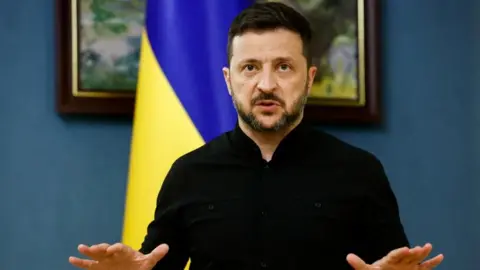In recent developments regarding the ongoing conflict between Russia and Ukraine, President Volodymyr Zelensky has publicly accused Russia of attempting to “buy time” to prolong their military operations. This assertion came forth shortly after former U.S. President Donald Trump claimed that progress towards a ceasefire had been made during a phone call he had with Russian President Vladimir Putin. Zelensky emphasized that Ukraine is prepared to negotiate, but called out Russia for presenting unrealistic conditions that hinder any potential resolution.
In a social media statement, Zelensky expressed his concerns, emphasizing the need for accountability: “If Russia continues to put forward unrealistic conditions and undermine progress, there must be tough consequences.” His remarks reflect the wider global apprehension regarding Russia’s intentions amidst negotiations for peace.
Trump’s recent dialogues with both Zelensky and Putin stirred some optimism, with Trump asserting that ceasefire talks between the two nations would commence immediately. However, Putin’s reply indicated a lack of urgency, as he mentioned he was open to discussing a “memorandum on a possible future peace agreement,” yet notably refrained from addressing calls for a 30-day cessation of hostilities.
The Kremlin’s position was further clarified on Tuesday when spokesperson Dmitry Peskov downplayed the relevance of immediate negotiations, stating that “there are no deadlines and there cannot be any.” This stance raises questions about the sincerity of Russia’s interests in pursuing an equitable end to the conflict.
The situation has prompted Zelensky to initiate a renewed diplomatic effort, reaching out to Western allies to bolster support for Ukraine. His discussions included a call with the Finnish president, where he underscored that Ukraine seeks to maintain pressure on Moscow to incite behavioral changes. Concurrently, both the European Union and the United Kingdom have taken steps to escalate sanctions against Russia. The EU has moved to blacklist nearly 200 oil tankers linked to Russia’s so-called “shadow fleet,” issuing stern warnings of increased repercussions should Moscow resist a truce.
The UK’s sanction package included restrictions on an additional eighteen tankers, targeting Russian military suppliers, energy exports, and financial institutions. These developments follow a significant drone assault on Ukraine that was the largest reported since the escalation of hostilities began in February 2022.
Amidst these diplomatic maneuvers, heavy fighting continues along the frontlines of Ukraine, marked by a reported 177 clashes and over 1,000 Russian casualties within the span of just 24 hours. German Defence Minister Boris Pistorius highlighted the urgency of the situation by stating, “Russia’s continued attacks speak louder than the lip service we have heard for so long,” implying that President Putin’s actions indicate a lack of genuine interest in securing peace.
While Zelensky invited Putin to meet for discussions in Istanbul, the Russian leader declined, and previous proposals for a joint U.S.-Ukrainian 30-day ceasefire have also been rejected. The Kremlin’s past announcements of temporary ceasefires further demonstrate the uncertainty surrounding claims of Russia’s willingness for peace, particularly when those ceasefires fall short of international expectations for extended hostilities.
Since the onset of the full-scale invasion, the war has irrevocably altered the geopolitical landscape and has intensified calls for accountability and resolution. The international community watches with concern as both parties navigate this complex and evolving situation, hoping for a diplomatic breakthrough that can lead to the restoration of peace and stability in the region.
As the conflict endures, the hesitation from Moscow juxtaposed with Zelensky’s assertive stance raises poignant questions about the pathway forward. Both allies and adversaries remain vigilant as the dynamics of this protracted conflict continue to unfold.



